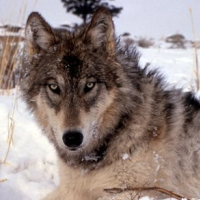Obama Administration Sides with Hunters over Protection of Gray Wolves
 (photo: AP/National Park Service)
(photo: AP/National Park Service)
The U.S. Fish and Wildlife Service (FWS) under President Barack Obama believes it is okay for hunters and ranchers to begin killing gray wolves again, a species that nearly went extinct last century.
FWS filed court documents with a Washington, DC-based court of appeals saying it opposed a federal judge’s decision to restore legal protection for gray wolves in the western Great Lakes region.
The Obama administration is joined by two states, Michigan and Wisconsin, which also objected to U.S. District Judge Beryl Howell’s ruling in December that said the states’ management plans for the wolves don’t do enough to protect the species. Howell’s ruling also applied to the management plan developed by Minnesota. The plans in all three states allow sports hunting; in Michigan and Wisconsin they also permit the trapping of wolves.
FWS spokeswoman Laury Parramore told the Associated Press: “The science clearly shows that wolves are recovered in the Great Lakes region, and we believe the Great Lakes states have clearly demonstrated their ability to effectively manage their wolf populations.”
But Howell believes more needs to be done for the animals.
The judge wrote that the Endangered Species Act (pdf) “offers the broadest possible protections for endangered species by design. This law reflects the commitment by the United States to act as a responsible steward of the Earth's wildlife, even when such stewardship is inconvenient or difficult for the localities where an endangered or threatened species resides.”
Russ Mason, wildlife division chief of the Michigan Department of Natural Resources, told AP that some sort of controls are needed for farmers to protect their livestock from predator wolves. A coalition of environmental groups has proposed most of the wolves be reclassified from “endangered” to “threatened,” which would allow livestock managers to kill them when they repeatedly attack farm animals. The Humane Society of the United States supports that position as a reasonable “middle ground.”
However, a recent study by at Washington State University determined that the killing of wolves that attack livestock actually brings about an increase in such wolf attacks.
The combined wolf population in Michigan, Minnesota and Wisconsin is about 3,700. The national population is believed to be less than 17,000. Nine states are considered by scientists to be Great Lakes wolves’ territory. Alaska has the largest gray wolf population.
Since 2003, the U.S. government has made four attempts to end protection of the wolves, and each time its effort was overturned in court.
Although FWS has already filed documents with the court, an agency spokesperson said that a final decision on whether to pursue the case has yet to be made by the U.S. Department of Justice.
-Noel Brinkerhoff, Danny Biederman
To Learn More:
2 States, Feds Appealing Judge's Ruling On Great Lakes Wolves (by John Flesher, Associated Press)
Feds Appeal Judge's Order To Protect Gray Wolves (by Renee Lews, Al Jazeera America)
Wolf Report Documents 20 Percent Population Increase (by George Plaven, East Oregonian)
Endangered and Threatened Wildlife and Plants; Reinstatement of Final Rules for the Gray Wolf in Wyoming and the Western Great Lakes in Compliance With Court Orders (Fish and Wildlife Service) (pdf)
Bills Would Drop Federal Protections For Wolves In 4 States (by John Flesher, Associated Press)
California Grants Protected Status to Nonexistent Gray Wolf (by Ken Broder, AllGov California)
Wyoming Ranchers Knock Gray Wolf Off Endangered Species List (by Matt Bewig, AllGov)
- Top Stories
- Unusual News
- Where is the Money Going?
- Controversies
- U.S. and the World
- Appointments and Resignations
- Latest News
- Musk and Trump Fire Members of Congress
- Trump Calls for Violent Street Demonstrations Against Himself
- Trump Changes Name of Republican Party
- The 2024 Election By the Numbers
- Bashar al-Assad—The Fall of a Rabid AntiSemite






Comments